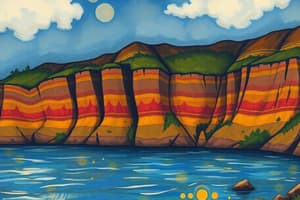Podcast
Questions and Answers
ما هو العنصر الرئيسي الذي يؤدي إلى تشكل الجبال والبراكين وحفر المحيطات؟
ما هو العنصر الرئيسي الذي يؤدي إلى تشكل الجبال والبراكين وحفر المحيطات؟
- الصفائح التكتونية (correct)
- الصخور الرسوبية
- الزلازل
- الصخور البركانية
ما هو نتيجة ثورة الصخور المذابة والرمادية والغازات من داخل الأرض؟
ما هو نتيجة ثورة الصخور المذابة والرمادية والغازات من داخل الأرض؟
- تقلب الصفائح التكتونية
- تشكل الصخور الرسوبية
- تشكل البراكين (correct)
- تشكل أنواعًا مختلفة من الحفر
ما هي الركامات التي يمكن العثور عليها في بقايا النباتات والحيوانات المحفوظة في التكوينات الجيولوجية؟
ما هي الركامات التي يمكن العثور عليها في بقايا النباتات والحيوانات المحفوظة في التكوينات الجيولوجية؟
- المستحاثات الكيميائية
- المستحاثات الجسدية (correct)
- الصخور البركانية
- المستحاثات المسارية
ما هي الطريقة التي يحدث بها الزلازل وتتمثل في إطلاق فجائي للضغط المخزن داخل قشرة الأرض؟
ما هي الطريقة التي يحدث بها الزلازل وتتمثل في إطلاق فجائي للضغط المخزن داخل قشرة الأرض؟
ما هو التأثير المهم للبراكين على أنماط الطقس والمجتمعات البشرية؟
ما هو التأثير المهم للبراكين على أنماط الطقس والمجتمعات البشرية؟
Flashcards are hidden until you start studying
Study Notes
Geology: An Introduction to Key Concepts and Processes
Geology is the scientific discipline focused on understanding the Earth's physical structure and substance, particularly its history, composition, and processes. It encompasses the study of various aspects of Earth through observation and experimentation to explain and understand its features and phenomena. Four fundamental branches of geology include mineralogy, petrology, geomorphology, and geodesy. Here, we delve into key geological concepts related to rock types, plate tectonics, fossils, earthquakes, and volcanoes.
Rock Types
Rock types refer to the diverse forms of solid aggregates composed of minerals and organic matter. These are classified based on their texture and mineral composition. Some common rock types include igneous rocks (formed from cooled and solidified molten rock), sedimentary rocks (formed by layers of sediments accumulated over millions of years), and metamorphic rocks (formed when existing rocks are transformed by heat or pressure).
Plate Tectonics
Plate tectonics is the theory that describes the movement of the Earth's lithosphere—the outermost shell consisting of the crust and the upper mantle—which is divided into several large and rigid segments called tectonic plates. These plates move slowly over the asthenosphere, the semi-fluid layer beneath the lithosphere. This motion occurs at speeds ranging from a few centimeters to tens of centimeters per year and leads to the formation of mountains, volcanoes, and ocean basins.
Fossils
Fossils are the remains or traces of organisms preserved in geological formations. They serve as evidence of the existence and evolution of plants and animals during specific time periods in Earth's history. There are three main types of fossils: body fossils (preserved skeletal remains), trace fossils (evidence of behavior or activities, such as footprints or burrows), and chemical fossils (organic molecules derived from ancient organisms, often found in petroleum deposits).
Earthquakes
Earthquakes occur when there is a sudden release of stress stored within the Earth's crust. Most of the world's earthquakes happen at plate boundaries where tectonic plates interact, resulting in a range of seismic activity from mild tremors to devastating catastrophes. The Richter scale measures the magnitude of an earthquake, while the Mercalli scale classifies its intensity.
Volcanoes
Volcanoes are landforms or landmarks that result from the eruption of molten rock, ash, and gases from the interior of the Earth. They come in various sizes and shapes and can have significant impacts on the environment, weather patterns, and human societies. Active volcanoes continue to grow and release lava periodically, while dormant ones show no signs of current eruption but may still experience small-scale geothermal activity.
These five essential elements of geology intersect and influence each other, shaping the diverse and dynamic nature of our planet. By studying these components, we gain a deeper understanding of the Earth's history, processes, and potential future changes.
Studying That Suits You
Use AI to generate personalized quizzes and flashcards to suit your learning preferences.




